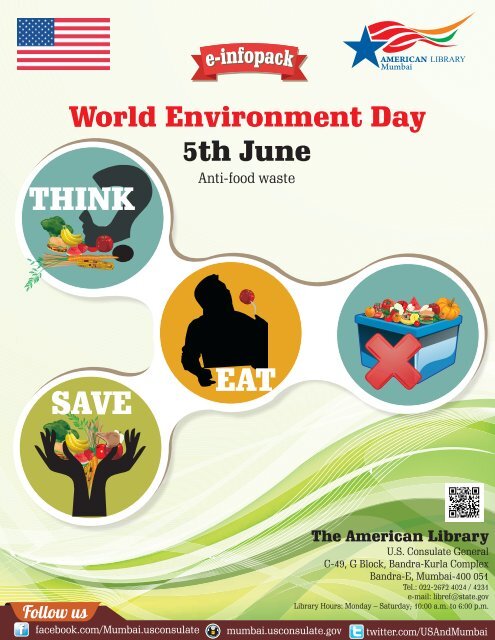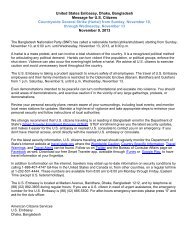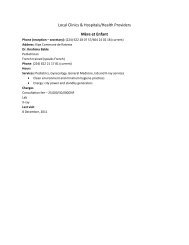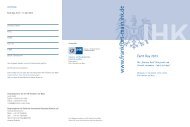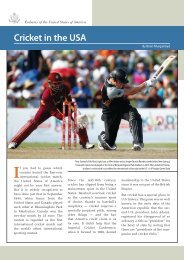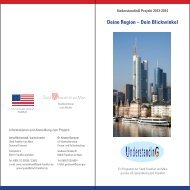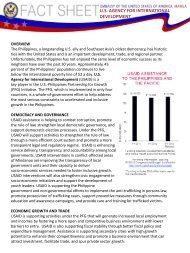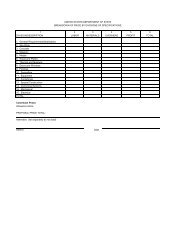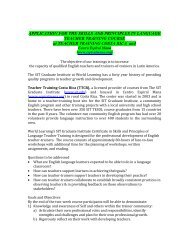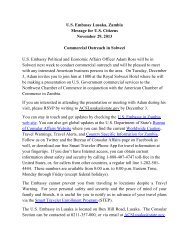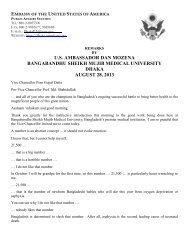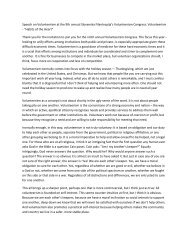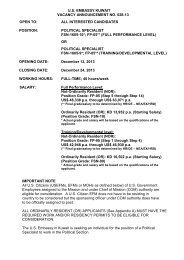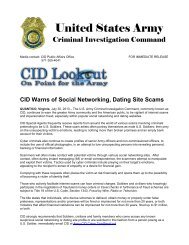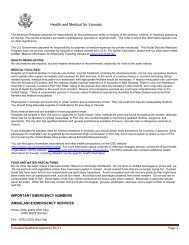World Environment Day
World Environment Day
World Environment Day
Create successful ePaper yourself
Turn your PDF publications into a flip-book with our unique Google optimized e-Paper software.
Mumbai<br />
LIBRARY<br />
<strong>World</strong> <strong>Environment</strong> <strong>Day</strong><br />
5th June<br />
THINK<br />
Anti-food waste<br />
SAVE<br />
EAT<br />
f<br />
Follow us<br />
The American Library<br />
U.S. Consulate General<br />
C-49, G Block, Bandra-Kurla Complex<br />
Bandra-E, Mumbai-400 051<br />
Tel.: 022-2672 4024 / 4231<br />
e-mail: libref@state.gov<br />
Library Hours: Monday – Saturday; 10:00 a.m. to 6:00 p.m.<br />
facebook.com/Mumbai.usconsulate mumbai.usconsulate.gov twitter.com/USAndMumbai
The United Nations <strong>Environment</strong> Programme<br />
The United Nations <strong>Environment</strong><br />
Programme (UNEP) theme for this year's<br />
<strong>World</strong> <strong>Environment</strong> <strong>Day</strong> celebrations is<br />
Think.Eat.Save.<br />
Think.Eat.Save is an anti-food waste and<br />
food loss campaign that encourages you to<br />
reduce your foodprint. According to the UN<br />
Food and Agriculture Organization (FAO),<br />
every year 1.3 billion tonnes of food is<br />
wasted. This is equivalent to the same<br />
amount produced in the whole of sub-<br />
Saharan Africa. At the same time, 1 in<br />
every 7 people in the world go to bed<br />
hungry and more than 20,000<br />
children under the age of 5 die daily<br />
from hunger.<br />
Given this enormous imbalance in lifestyles<br />
and the resultant devastating effects on the<br />
environment, this year's theme –<br />
Think.Eat.Save – encourages you to become<br />
more aware of the environmental impact of<br />
the food choices you make and empowers<br />
you to make informed decisions.<br />
While the planet is struggling to<br />
provide us with enough resources to<br />
sustain its 7 billion people (growing<br />
to 9 billion by 2050), FAO estimates that<br />
a third of global food production is either<br />
wasted or lost. Food waste is an enormous<br />
drain on natural resources and a<br />
contributor to negative environmental<br />
impacts.<br />
This year's campaign rallies you to take<br />
action from your home and then witness<br />
the power of collective decisions you and<br />
others have made to reduce food waste,<br />
save money, minimize the environmental<br />
impact of food production and force food<br />
production processes to become more<br />
efficient.<br />
If food is wasted, it means that all the<br />
resources and inputs used in the<br />
production of all the food are also lost. For<br />
example, it takes about 1,000 litres of<br />
water to produce 1 litre of milk and<br />
about 16,000 litres goes into a cow's<br />
food to make a hamburger. The<br />
resulting greenhouse gas emissions from<br />
the cows themselves, and throughout the<br />
food supply chain, all end up in vain when<br />
we waste food.<br />
In fact, the global food production<br />
occupies 25% of all habitable land<br />
and is responsible for 70% of fresh<br />
water consumption, 80% of<br />
deforestation, and 30% of greenhouse<br />
gas emissions. It is the largest single<br />
driver of biodiversity loss and land-use<br />
change.<br />
Making informed decision therefore means,<br />
for example, that you purposefully select<br />
foods that have less of an environmental<br />
impact, such as organic foods that do not<br />
use chemicals in the production process.<br />
Choosing to buy locally can also mean that<br />
foods are not flown halfway across the<br />
world and therefore limit emissions.<br />
So think before you eat and help save our<br />
environment!<br />
Source:<br />
http://www.unep.org/wed/theme/<br />
Mongolia, which is prioritizing a Green Economy shift across its big economic sectors such as mining and promoting environmental awareness<br />
among youth, is to host this year's <strong>World</strong> <strong>Environment</strong> <strong>Day</strong> (WED) celebrations on June 5,<br />
See more at http://www.unep.org/wed/news/hostcountry2013.asp#sthash.WrLMPaUm.dpuf:<br />
UNEP – Think, Eat, Save A-Z<br />
http://www.unep.org/wed/A-Z/<br />
UNEP – Food Waste Facts<br />
http://www.unep.org/wed/quickfacts/<br />
e-infopack: Think.Eat.Save Page: 2
U.S. <strong>Environment</strong>al Protection Agency<br />
Reducing Wasted Food Basics<br />
Most people don't realize how much food they throw away every day —<br />
from uneaten leftovers to spoiled produce. More than 97 percent of the<br />
food we throw away end up in landfills. In 2010, we landfilled 33 million<br />
tons of food waste. Once in landfills, food breaks down to produce<br />
methane, a potent greenhouse gas which contributes to climate change.<br />
Benefits of Reducing Wasted Food<br />
Saves money from buying less food.<br />
Reduces methane emissions from landfills and lowers your carbon<br />
footprint.<br />
Conserves energy and resources, preventing pollution involved in<br />
the growing, manufacturing, transporting, and selling food (not to<br />
mention hauling the food waste and then landfilling it).<br />
Supports your community by providing donated untouched food<br />
that would have otherwise gone to waste to those who might not<br />
have a steady food supply.<br />
Ways to Reduce Wasted Food<br />
Shop your refrigerator first! Cook or eat what you already have at home before buying more.<br />
Plan your menu before you go shopping and buy only those things on your menu.<br />
Buy only what you realistically need and will use. Buying in bulk only saves money if you are<br />
able to use the food before it spoils.<br />
Be creative! If safe and healthy, use the edible parts of food that you normally do not eat. For<br />
example, stale bread can be used to make croutons and beet tops can be sautèed for a<br />
delicious side dish.<br />
Nutritious, safe, and untouched food can be donated to food banks to help those in need.<br />
Freeze, preserve, or can surplus fruits and vegetables - especially abundant seasonal<br />
produce.<br />
At restaurants, order only what you can finish by asking about portion sizes and be aware of<br />
side dishes included with entrees. Take home the leftovers and keep them for your next<br />
meal.<br />
At all-you-can-eat buffets, take only what you can eat.<br />
Compost food scraps rather than throwing them away.<br />
<strong>World</strong> <strong>Environment</strong> <strong>Day</strong> – Portland, Oregon<br />
http://www.portlandoregon.gov/wed/<br />
The United Nations <strong>Environment</strong> Programme Regional Office of North America has selected the<br />
City of Portland to host this year's <strong>World</strong> <strong>Environment</strong> <strong>Day</strong> (WED) on June 5, 2013.<br />
e-infopack: Think.Eat.Save Page: 3
Food<br />
makes up the<br />
largest percentage<br />
of waste going to municipal landfills<br />
and combusted for energy recovery<br />
21%<br />
Food<br />
9%<br />
4%<br />
33 million tons of food waste<br />
reach landfills each year in the<br />
United States. This food could<br />
be prevented, used to feed<br />
people, or composted to<br />
create a valuable soil<br />
amendment.<br />
8%<br />
16%<br />
Yard Trimmings<br />
Other<br />
Paper and paperboard<br />
7%<br />
4%<br />
17%<br />
9%<br />
5%<br />
Glass<br />
Metals<br />
Plastics<br />
Rubber and Leather<br />
Textiles<br />
Woods<br />
Source: http://www.epa.gov/wastes/conserve/foodwaste/<br />
Data from the 2010 Municipal Solid Waste Characterization Report<br />
Other useful EPA links:<br />
Food Waste Management Tools and Resources<br />
http://www.epa.gov/wastes/conserve/foodwaste/fd-tools_rescrs.htm<br />
e-infopack: Think.Eat.Save Page: 4
ebsites<br />
The Bill Emerson Good Samaritan<br />
Food Donation Act<br />
http://gbfb.org/_pdf/help/<br />
GoodSamaritanFoodDonationAct.pdf<br />
End Food Waste Now<br />
http://www.endfoodwastenow.org/<br />
Feeding America<br />
http://feedingamerica.org/<br />
Food Rescue<br />
http://foodrescue.net/<br />
Food Shift<br />
http://www.foodshift.net/<br />
The Think.Eat.Save campaign of the<br />
Save Food Initiative<br />
http://www.thinkeatsave.org/<br />
United Nations <strong>Environment</strong> Program-<br />
<strong>World</strong> <strong>Environment</strong> <strong>Day</strong><br />
http://www.unep.org/wed/<br />
Reports<br />
Global food Losses and Food Waste: Extent,<br />
Causes and Prevention, 2011<br />
Food and Agriculture Organization of the United Nations<br />
http://www.fao.org/fileadmin/user_upload/suistainability/pdf/<br />
Global_Food_Losses_and_Food_Waste.pdf<br />
International Food Policy Research Institute<br />
2012 Global Hunger Index Report<br />
http://leanpath.com/docs/Waste_Guide_2012.pdf<br />
http://www.ifpri.org/publication/2012-global-hunger-index-0<br />
A Short Guide to Food Waste Management<br />
Best Practices<br />
Leanpath,2008<br />
http://leanpath.com/docs/Waste_Guide_2012.pdf<br />
Waste Not Want Not: Feeding the Hungry and<br />
Reducing Solid Waste Through Food Recovery<br />
U.S. <strong>Environment</strong>al Protection Agency/<br />
United States Depart of Agriculture<br />
http://www.nrdc.org/food/wastes/conserve/pubs/wast_not.pdf<br />
Wasted: How America Is Losing Up to 40<br />
Percent of Its Food from Farm to Fork to Landfill<br />
Natural Resources Defense Council, August 2012<br />
http://www.nrdc.org/food/files/wasted-food-IP.pdf<br />
e-infopack: Think.Eat.Save Page: 5
Select Articles<br />
Boost Waste Research<br />
to Secure Food Supply<br />
by Scattergood, Gary.<br />
Food Manufacture. Apr2013, Vol. 88 Issue 4, p4-5. 2p<br />
The article focuses on issues concerning the impact<br />
of research for reducing food waste on the<br />
improvement of food security. John Ingram, the<br />
food security leader at the Natural <strong>Environment</strong><br />
Research Council, stresses that waste research<br />
create a greater impact on improving food security<br />
than the equivalent amount spent on increasing<br />
production. Information about a new report from the<br />
Waste & Resources Action Programme is provided.<br />
Gone to Waste<br />
by Frykholm, Amy.<br />
Christian Century. 8/23/2011, Vol. 128 Issue 17, p30-32. 3p.<br />
The article presents discussion regarding the<br />
management policies of the grocery store chain<br />
Safeway, trends in supermarket food management,<br />
and waste. Accounts are given describing the<br />
chain's official policy which refuses to donate unsold<br />
produce. The author then criticizes the company<br />
and similar stores for being wasteful and<br />
irresponsible towards its social responsibilities and its<br />
ecological efficiency.<br />
Packaging Shares Blame<br />
for Food Waste<br />
by Pierce, Lisa McTigue.<br />
Packaging Digest. Oct2012, Vol. 49 Issue 10, p82-84. 3p.<br />
The article informs that the packaging system is one of the<br />
reasons of food wastage in the U.S. It discusses several<br />
packaging flaws including damaged packaging, date<br />
coding and large portion sizes which are responsible for<br />
food wastage. It also mentions that the U.S. government<br />
should take steps to prevent the wastage and food losses<br />
and set national goals for waste reduction.<br />
Supply Scan<br />
Food Logistics. Jan/Feb2013, Issue 143, p8-10. 2p<br />
This section offers news briefs on the food supply chain.<br />
Insignia Technologies will launch its newest colorchanging<br />
labels which aim to lower food waste and<br />
improve food safety in 2013. Terra Technology has<br />
launched an online Sustainability Calculator which<br />
enables manufacturers to determine the environmental<br />
impact of reducing excess stocks through improved<br />
demand prediction and inventory optimization.<br />
How to Cut<br />
Pre-Consumer Food Waste.<br />
by Shakman, Andrew.<br />
Food Management. Dec2012,Vol. 47 Issue 12, p38-39. 2p.<br />
The article offers key steps to cutting pre-consumer<br />
food waste to cut costs in a foodservice operation. It<br />
suggests to learn the U.S. <strong>Environment</strong>al Protection<br />
Agency (EPA) food waste hierarchy, which clarifies<br />
the order of priority for waste management tools<br />
and methods. Also, it recommends to establish a<br />
waste preventing culture, track food waste every<br />
day, and set goals for food waste reduction.<br />
e-infopack: Think.Eat.Save Page: 6
Select Articles<br />
Supporting Farmers,<br />
Eating Local Food<br />
by Salatin, Joel.<br />
Mother Earth News. Jun/Jul2012, Issue 252, p34-38. 5p.<br />
The article discusses consuming locally grown food to<br />
reduce food wastage and increasing farming. The<br />
author highlights the fact that half of all food for human<br />
consumption never gets eaten. The author believes<br />
that if every kitchen in America had chickens attached<br />
to it to eat all of the scraps, no egg industry would be<br />
necessary.<br />
Sustainable Food<br />
Management in Action<br />
by Zanolli, Ashley.<br />
BioCycle. Mar2012, Vol. 53 Issue 3, p48-51. 4p.<br />
The article reports on the launch of the Food<br />
Recovery Challenge (FRC) by the U.S. <strong>Environment</strong>al<br />
Protection Agency (EPA) in 2011. It says that the FRC<br />
aimed to offer awareness on the number of food<br />
unnecessarily thrown by people in the country and<br />
the ways to prevent it. It notes that the EPA urged<br />
Americans to get involved in three food diversion<br />
areas which include prevention, donation, and<br />
composting.<br />
Waste Not, Want Less<br />
by Kirshenbaum, Sheril; Webber, Michael.<br />
New Scientist. 8/14/2010, Vol. 207 Issue 2773, p3-3. 1p.<br />
The article focuses on food waste and its effect on the<br />
environment. It states that the energy footprint of food is<br />
significant, with 15 percent of U.S. energy use utilized by<br />
food production and distribution. It mentions that<br />
Americans waste between 25 and 33 percent of food<br />
produced in the U.S. due to spoilage and minor<br />
blemishes. It talks about the need to educate the public<br />
on proper methods of storing food to keep it edible.<br />
Wasted Food:<br />
What We Are Doing<br />
to Prevent Costly Losses<br />
by Fireovid, Robert L.<br />
Agricultural Research. Mar2013, Vol. 61 Issue 3, p2-2. 1p.<br />
The article discusses the efforts of the Agricultural<br />
Research Service (AGR) to reduce losses in the food<br />
systems. It notes that by reducing wasted foods, U.S.<br />
growers, processors and others can help enhance the<br />
country's ability to produce foods for itself and the world.<br />
The goal of cutting food losses by 15 % is mentioned. The<br />
author states that 15% reduction in food losses can<br />
provide extra food to feed more than 25 million<br />
Americans yearly.<br />
Tightening the Belt by<br />
Reducing Food Waste<br />
by Dominguez, Sarah; Moreno, Laura.<br />
BioCycle. Nov2012, Vol. 53 Issue 11, p29-31. 3p.<br />
The article focuses on the launch by the U.S.<br />
<strong>Environment</strong>al Protection Agency (EPA) of the Food<br />
Recovery Challenge (FRC) which aims to reduce<br />
food waste in the U.S. It profiles the three pioneer<br />
participants of the FRC including the Los Angeles,<br />
California-based Dodger Stadium, Clark University,<br />
and New England-based Hannaford Markets. It<br />
discusses their recycling programs with food waste,<br />
sustainable food management, and donations to<br />
local hunger relief organizations.<br />
For full text of articles:<br />
write to<br />
libref@state.gov<br />
e-infopack: Think.Eat.Save Page: 7
Campaigns<br />
EPA Food Recovery Challenge<br />
The Sustainable Materials Management<br />
division of the EPA is hosting a Food<br />
Recovery Challenge that is open to<br />
universities, grocers, stadiums and other<br />
large venues. Once a participant signs up,<br />
they set a waste reduction goal and work<br />
toward it.<br />
Go Halfsies<br />
Go Halfsies is a campaign to reduce food<br />
waste, help alleviate hunger and offer<br />
better portion sizes for restaurant goers. The<br />
concept is simple - when you see the<br />
Halfsies icon next to a menu item, order a<br />
half portion. You will receive less food and a<br />
portion of what you pay will go to help feed<br />
the hungry.<br />
International Smart Gear Competition<br />
The <strong>World</strong> Wildlife Fund hosts the<br />
International Smart Gear Competition and<br />
brings together the fishing industry, research<br />
institutes, universities, and government to<br />
inspire and reward practical, innovative<br />
fishing gear designs that reduce bycatch -<br />
the accidental catch and related deaths of<br />
sea turtles, birds, marine mammals,<br />
cetaceans and non-target fish species in<br />
fishing gear such as longlines and nets.<br />
More than $50,000 in prize money is given<br />
out.<br />
Squawkfox Food Waste Challenge<br />
The blogger for Squawkfox issued a food<br />
waste challenge in April of 2012, asking<br />
readers to reduce their food waste. She<br />
estimated that the readership of the blog<br />
could save $55 million annually if efforts<br />
were made to waste less food.<br />
Think. Eat. Save.<br />
This international campaign was launched<br />
in January 2013 by the UN <strong>Environment</strong><br />
Programme (UNEP), the Food and<br />
Agriculture Organization (FAO) and others.<br />
It specifically targets food wasted by<br />
consumers, retailers and the hospitality<br />
industry.<br />
VIDEOS<br />
Dive - A documentary about dumpster diving<br />
and food waste.<br />
The Global Food Waste Scandal<br />
TED talk by Tristram Stuart, author of the book 'Waste:<br />
Uncovering the Global Food Scandal'<br />
TEDx Manhattan's 3rd Annual "Changing the Way<br />
We Eat" is a program of local video and live<br />
speakers combining to spark deep discussion and<br />
connection about the impact of the changing<br />
food system. The event took place in New York City<br />
on Saturday, February 16, 2013. See all the talks<br />
online. Including Peter Lehner, Executive Director of<br />
Natural Resources Defense Council, talk about how<br />
we can reduce food waste.<br />
Note: Links to web sites in this listing are for the<br />
convenience of the user and should not be construed<br />
as an endorsement of the views contained therein.<br />
URLs are current as of June 2013.<br />
e-infopack: Think.Eat.Save Page: 8
eBooks on food from<br />
http://elibraryusa.state.gov<br />
A Nation<br />
of Farmers<br />
Defeating<br />
the Food<br />
Crisis on<br />
American Soil<br />
by Sharon Astyk<br />
New Society Publishers,<br />
(2009)<br />
Closing the<br />
Food Gap<br />
No-Nonsense<br />
Guide to<br />
<strong>World</strong> Food<br />
by Mark Winne by Wayne Roberts<br />
Beacon Press, New Internationalist,<br />
(2008)<br />
(2008)<br />
Philosophy<br />
of Food<br />
by David M Kaplan<br />
University of California<br />
Press,<br />
(2012)<br />
Making a<br />
Meal of It:<br />
Smart Ways to Buy,<br />
Store and Use<br />
Up Food<br />
Food Safety<br />
Information Handbook<br />
by Roberts, Cindy;<br />
Greenwood Press;<br />
Westport, CT, USA<br />
(July 2001)<br />
Food Safety<br />
Information Handbook<br />
by Rosemary Cadden, by Cindy Roberts,<br />
Jane Wilcox, Greenwood Press,<br />
Wakefield Press,<br />
(2001)<br />
(2011)<br />
Food Fears:<br />
From Industrial to<br />
Sustainable Food<br />
Systems<br />
by Alison Blay-Palmer,<br />
Ashgate Publishing<br />
Group,<br />
(2008)<br />
To access<br />
books online<br />
write to<br />
libref@state.gov<br />
e-infopack: Think.Eat.Save Page: 9


